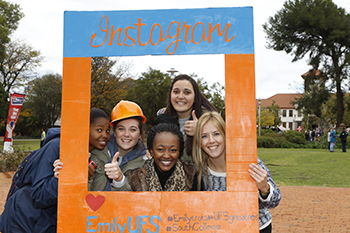Latest News Archive
Please select Category, Year, and then Month to display items
12 October 2020
|
Story Arina Engelbrecht
|
Photo Supplied
 Arina Engelbrecht from Organisational Development and Employee Well-being believes physical activity has a number of benefits for one’s health, including stress relief.
Arina Engelbrecht from Organisational Development and Employee Well-being believes physical activity has a number of benefits for one’s health, including stress relief.
Being physically active plays a big role in preventing the development of mental-health problems and in improving the quality of life of people experiencing mental-health problems.
Treatment for depression
Physical activity can be an alternative treatment for depression. It can be used as a stand-alone treatment or in combination with medication and/or psychological therapy. It promotes all kinds of changes in the brain, including neural growth, reduced inflammation, and new activity patterns are formed that promote feelings of calm and well-being. It releases endorphins – powerful chemicals in the brain that energise your spirit and make you feel good.
Physical activity can be very effective in relieving stress. Research in adults has found that physically active individuals tend to have lower stress levels compared to individuals who are less active. It also leads to improved sleep. When a person sleeps better and feels more rested, overall quality of life improves. They cope better with daily life stressors.
Reduce Alzheimer's risk
Regular physical activity can reduce your risk of developing Alzheimer's disease by up to 50%. It can also slow down further deterioration in those who have already started to develop cognitive problems. It stimulates the brain’s ability to maintain old connections as well as to make new ones.
A study asked people to rate their mood immediately after periods of physical activity (e.g. going for a walk/run, cycling, doing housework) and periods of inactivity (e.g. reading a book or watching television). Researchers found that participants felt more content, more awake, and calmer after being physically active compared to after periods of inactivity.
In conclusion, people who are physically active feel a sense of well-being, feel more energetic throughout the day, sleep better at night, have sharper memories, and feel more relaxed and positive about themselves and their lives.
“Being physically active not only changes your body, it changes your mind,
attitude, and your mood.” – Arina Engelbrecht
Become part of the Kovsie family
2017-04-13

Photo: Johan Roux
Open Day is a great opportunity to experience the Kovsie vibe, visit the residences, campus facilities and faculties, and receive academic and career advice. You can collect as many faculty pamphlets and programme booklets as possible to browse through later.
You will be welcomed by the new Vice-Chancellor and Rector, Prof Francis Petersen, be entertained by Swing City, enjoy laser shows, and participate in fun games with Teambo.
Bloemfontein Campus
Date: 13 May 2017
Prospective students’ and parents’ session: 08:30-09:30
School groups’ session: 11:00-12:00
Venue: Callie Human Centre, Bloemfontein Campus
Academic and career advice: 08:30-15:00
Venue: Scholtz Hall, Bloemfontein Campus
Faculty sessions: 10:30
Venues for the faculty sessions:
• Economic and Management Sciences: EMS Auditorium
• Education: Education Auditorium
• Health Sciences: Francois Retief Building
• Humanities: Odeion
• Natural and Agricultural Sciences: Agriculture Building
• Law: Equitas Auditorium
• Theology and Religion: Theology Building, Room 21
Residence and Student Life stalls: Red Square in front of the Main building.
Student association stalls: Thakaneng Bridge.
View our campus map and the full programme.
Qwaqwa Campus
The UFS Qwaqwa Campus will host their Open Day on Saturday 20 May 2017.
Applications to study in 2018 are now open
Want to become a Kovsie student? Make sure not to miss the Open Days and also see the 9 steps on how to become a UFS student.
For more information, contact the Unit for Prospective students on:
+27 51 401 3000 | info@ufs.ac.za